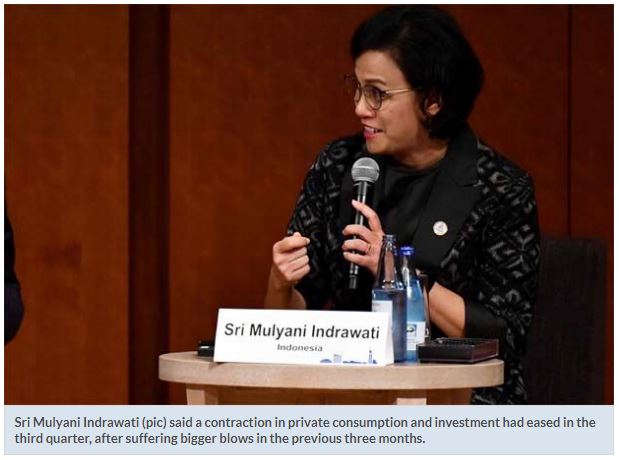Indonesia says ‘worst is over’ after Q3 GDP fell into recession
JAKARTA: Indonesia’s finance minister said “the worst is over” for South-East Asia’s largest economy, after third-quarter gross domestic product (GDP) data confirmed the country fell into recession for the first time since 1998.
Sri Mulyani Indrawati (pic) said a contraction in private consumption and investment had eased in the third quarter, after suffering bigger blows in the previous three months.
Government moves to control the coronavirus outbreak and ensure public discipline with health protocols would determine whether the economy could further recover and see a GDP expansion in the fourth quarter, Sri Mulyani said.
Indonesia suffered its first recession in over two decades in the third quarter and millions of people lost their jobs over the past year as the Covid-19 pandemic battered South-East Asia’s largest economy, the statistics bureau said.
GDP shrank by a slightly more than expected 3.49% year-on-year as household consumption fell while investment also dropped in the third quarter, official data showed. Economists in a Reuters poll had expected GDP to fall 3% after a 5.32% contraction in the second quarter.
While Finance Minister Sri Mulyani Indrawati said in a press conference “the worst is over”, pointing to a pick-up in quarterly growth, the statistics bureau said some 2.67 million people had lost their jobs in the year to August due to Covid-19.
A 9.8% rise in government spending helped soften the blow, but economists called on more stimulus to help lift the economy out of the doldrums.
“Given the unfathomably slow pace of fiscal stimulus disbursement… the pressure is on monetary policy to do more, ” said Wellian Wiranto, economist with OCBC.
Indonesia’s first recession since the Asian financial crisis in 1998 – normally defined as two consecutive quarters of economic contraction – comes as the country has struggled to contain the coronavirus outbreak.
With the highest case load and Covid-19 death toll in South-East Asia, Indonesia’s government in September introduced a second round of restrictions in the capital Jakarta as it tried to contain the spread of the virus amid rising cases.
Household consumption, normally the economy’s main growth engine, fell 4% on an annual basis, while investment dropped 6.5%. Indonesia’s exports tumbled 10.8% as global demand remained tepid amid the global pandemic.
The government has pledged to accelerate spending, while Bank Indonesia governor Perry Warjiyo has said the central bank has further room to act after 100 basis points of rate cuts this year and more than US$30bil of government bond purchases.
The data comes after thousands of people took to the streets in the youthful nation in October calling for the reversal of a controversial law aimed at job creation but which some say favours business interests at the expense of the environment and labour.
David Sumual, an economist at Bank Central Asia, said the recession was unlikely to trigger social unrest due to the increase in social spending for the most affected communities.
On a quarterly, non-seasonally adjusted basis, GDP grew 5.05% in the June-September period, but that was also slightly below expectations for 5.34% rise in the Reuters poll. — Reuters


 Thailand
Thailand




